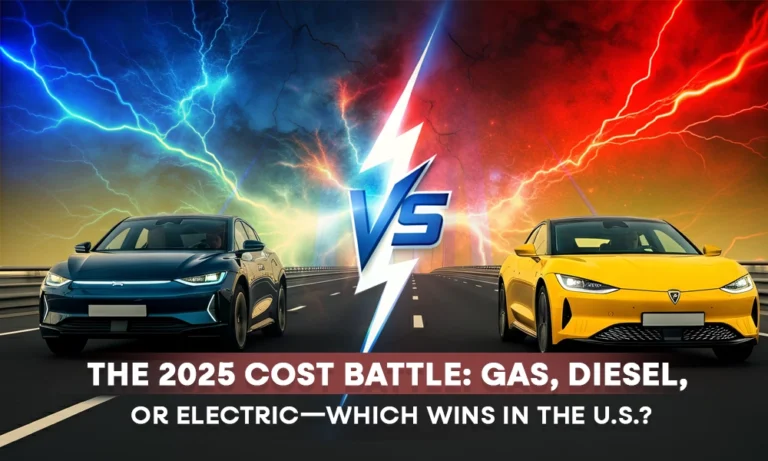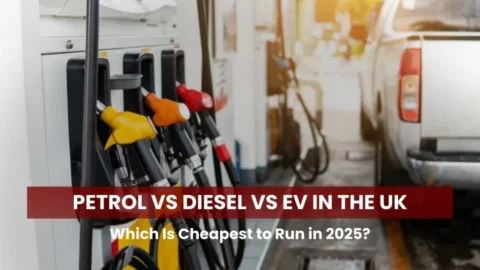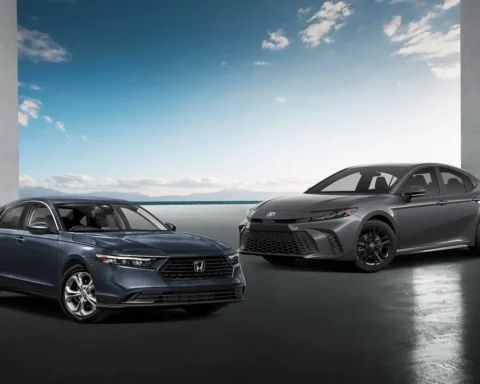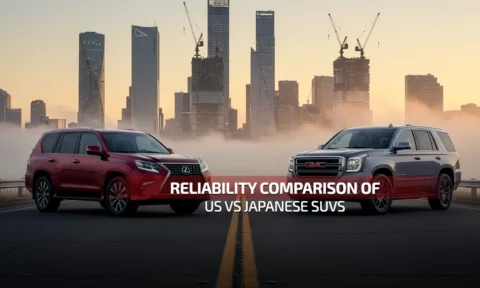Let’s be honest—choosing a car in 2025 feels less like shopping and more like strategizing. The fact that fuel prices are constantly fluctuating, tax credits are evolving as we speak, and the rising popularity of cleaner fuel and electric everything makes one wonder, What’s the best option for my wallet?
So I thought I’d do the math in this blog and try to figure out which would benefit my wallet the most: gas, diesel, or electric. Let’s get to the analysis.
Table of Contents
Upfront costs
Fuel Costs
Maintenance costs
Geographical impact on costs
And the winner is. . . .
Final Thoughts
Upfront Costs
Despite the huge technological advancements we are witnessing, I think gas-powered cars still remain the most affordable option upfront, with average prices hovering just under $50,000. Of the two, diesel vehicles tend to be pricier, especially if you are considering trucks and SUVs. Then what about electric vehicles (EVs), you ask? Well, these cars continue to remain a tad more pricey than ICE cars—around $55,000—and federal tax credits of up to $7,500, which helped shrink that gap, will only be available up to this year. That’s because the sweeping One Big Beautiful Bill Act scraps these tax credits from 2026 onwards. While EVs did seem competitively priced with the tax credits and long-term savings they offered, they have become less so ever since the tax credits have been removed. I would definitely think twice before investing in an EV in the current circumstances.
Fuel Costs
When it comes to fuel costs, EVs win hands down. Studies indicate that charging an EV for a year—assuming around 15,000 miles of driving—costs roughly $675. When compared to gas, which can run you over $2,200 annually, or diesel, which lands just under $2,000 depending on your region, that’s a difference of more than $1,500 every single year. When you multiply that figure over five years, you will have enough savings to fund a vacation or maybe invest it in a home project. When it comes to savings on fuel costs, EVs are the shining stars!
Maintenance Costs
Okay, I’ll concede, when it comes to maintenance costs, too, EVs have the upper hand. You don’t need to get an EV’s oil changed, nor do you need spark plug replacements. Given that an EV doesn’t have the numerous moving parts of an ICE engine that could break down and require regular maintenance, the cost of maintaining an EV adds up to much less than that of a gas or diesel vehicle. Some researchers state that over time, EV owners spend 30 to 50 percent less on maintenance compared to gas or diesel drivers. That can mean thousands in savings, and I’m not taking into consideration the unwanted surprise visits to the mechanic you have to make as an ICE car owner!
Geographical Impact On Vehicle Costs
Now, where you live also plays a huge role in how much your vehicle is going to cost you in the long run. That’s mainly due to the geographical variations in fuel prices. If you live in California, where gas prices flirt with $5 a gallon, investing in EVs, I feel, is a no-brainer. But in places like Oklahoma or Texas, where gas costs just about $3, the advantage offered by an EV narrows.
Then there is also the charging infrastructure you need to consider. If you live in a city with plenty of public chargers—or have a home setup—driving an EV is easy. But if you’re in a rural area with limited access, getting a diesel car might still be the practical choice.
And the Winner is …
Well, I really can’t make up my mind about this. There are so many factors that complicate the issue. So the best way to go about it would be to declare conditional winners!
If you drive a lot, live in a state with high fuel prices, have access to home charging, and plan to keep your car for more than five years, an electric car is the clear winner for you. You’ll save on fuel, maintenance, and possibly even insurance coverage.
But if you drive less, update your ride every few years, or live somewhere where charging is a hassle, opting for a gas or diesel car might still make sense.
Final Thoughts
I’m reasonably sure that ultimately, the real winner in 2025 will not be just the cheapest option. It’s more likely to be the one that fits my lifestyle. While I can see EVs becoming increasingly popular across the world, their upfront costs tend to be a deterrent, especially without incentives from the government. But these vehicles definitely offer lower operating costs and fewer maintenance headaches. Hence, choose your drive based on an assessment of your own driving needs, finances, and where you live, and you will probably choose a winner! Visit Us https://www.nrdc.org/stories/electric-vs-gas-cars-it-cheaper-drive-ev







